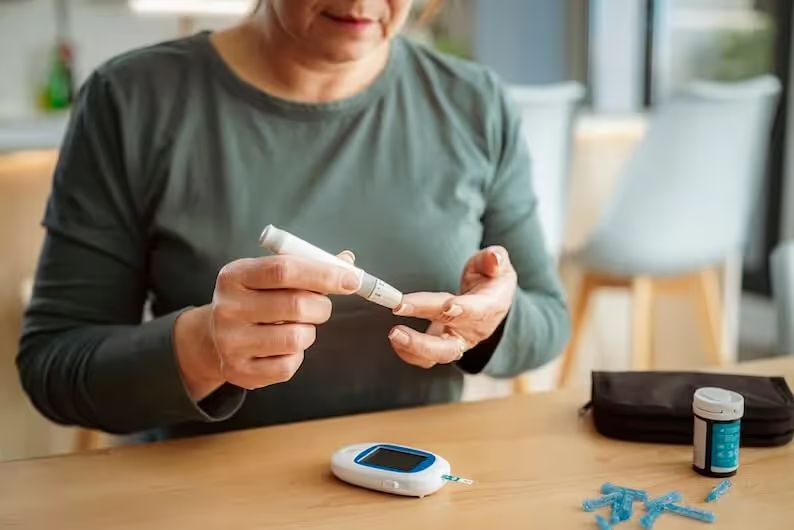Controlling and being able to avoid blood sugar spikes is crucial for maintaining good health, especially in seniors who are more susceptible to complications from high blood sugar levels. When blood sugar levels rise rapidly, it can lead to health problems such as type 2 diabetes, cardiovascular disease, and nerve damage. Keeping average blood sugar levels stable helps reduce the risk of these complications and supports better overall health. By reducing the intake of carbohydrate-rich foods and incorporating balanced meals, seniors can keep their blood sugar in check. Maintaining control over blood sugar spikes not only prevents immediate discomfort and health issues but also contributes to long-term well-being and a better quality of life. Here are some practical tips to help you keep your blood sugar levels steady and avoid spikes.
1. Maintain a Balanced Diet
A balanced diet is key to maintaining stable blood sugar levels in seniors. Here's how you can achieve it:
- Include Fiber-Rich Foods: Foods high in fiber, such as whole grains, vegetables, fruits, and legumes, slow down the absorption of sugar, preventing spikes. Aim for at least 25-30 grams of fiber per day.
- Choose Low Glycemic Index (GI) Foods:Low GI foods cause a slower rise in blood sugar. Examples include oats, beans, lentils, apples, and non-starchy vegetables like broccoli and spinach.
- Limit Sugary and Processed Foods: Avoid foods high in sugar and refined carbs, such as candies, pastries, white bread, and sugary drinks. These can cause rapid spikes in blood sugar.
- Healthy Fats and Proteins: Incorporate healthy fats (avocados, nuts, olive oil) and lean proteins (chicken, fish, tofu) into your meals. They help slow down the digestion and absorption of carbohydrates.
2. Eat Regular Meals and Snacks
- Eat Consistently: Having meals and snacks at regular intervals helps maintain stable blood sugar levels. Avoid skipping meals, as it can lead to overeating later and cause spikes.
- Portion Control: Be mindful of portion sizes. Eating large portions can cause blood sugar to spike. Use smaller plates and avoid second helpings to manage portion sizes effectively.
3. Stay Hydrated
- Drink Water: Dehydration can lead to higher blood sugar levels. Aim to drink at least eight glasses of water a day. Limit sugary drinks, which can cause spikes.
4. Engage in Physical Activity
- Exercise Regularly: Physical activity helps your body use insulin more efficiently and lowers blood sugar levels. Aim for at least 150 minutes of moderate exercise, such as walking, swimming, or cycling, each week.
- Stay Active Throughout the Day: Even small activities like gardening, cleaning, or walking around the house can help keep your blood sugar levels stable.
5. Monitor Your Blood Sugar Levels
- Regular Checks: If you have diabetes, regularly monitoring your blood sugar levels can help you understand how different foods and activities affect your blood sugar. Follow your healthcare provider's recommendations for testing frequency.
- Keep a Log: Maintain a log of your blood sugar readings, diet, and physical activity. This can help you and your healthcare provider make necessary adjustments to your management plan.
6. Manage Stress
- Stress Reduction Techniques: Stress can affect your blood sugar levels.Practice relaxation techniques such as deep breathing, meditation, yoga, or hobbies that you enjoy.
- Adequate Sleep: Ensure you get seven to nine hours of sleep per night. Poor sleep can negatively affect blood sugar levels.
7. Monitor Medications and Supplements
- Follow Prescriptions: If your doctor has prescribed medication for blood sugar control, take it as directed. Do not skip doses or make changes without consulting your healthcare provider.
- Supplements: Some supplements, such as chromium and magnesium, may help manage blood sugar levels and prevent blood sugar spikes. Discuss with your healthcare provider before starting any new supplements.
8. Consult Your Healthcare Provider
- Regular Check-ups: Keep up with regular appointments with your healthcare provider. They can help monitor your blood sugar levels and make adjustments to your management plan as needed.
- Personalized Advice: Every individual is different. Your healthcare provider can give you personalized advice on how to control your blood glucose levels based on your health condition and needs.
Managing blood sugar levels is essential for maintaining good health, especially for seniors. By following these tips, you can avoid blood sugar spikes and lead a healthier life. Remember, small changes can make a big difference in your overall health and well-being.
Healthy Eating Recipe to Avoid Blood Sugar Spikes
Quinoa and Vegetable Salad
Ingredients:
- 1 cup quinoa
- 2 cups water
- 1 cup cherry tomatoes, halved
- 1 cucumber, diced
- 1 bell pepper, diced
- 1/4 red onion, finely chopped
- 1 avocado, diced
- 1/4 cup fresh parsley, chopped
- 1/4 cup feta cheese, crumbled (optional)
- 2 tablespoons olive oil
- 1 tablespoon lemon juice
- Salt and pepper to taste
- 3/4 cup chickpeas (optional)
Instructions:
- Rinse the quinoa under cold water. In a medium saucepan, bring the quinoa and water to a boil. Reduce the heat, cover, and simmer for about 15 minutes, or until the water is absorbed and the quinoa is tender.
- Fluff the quinoa with a fork and let it cool.
- In a large bowl, combine the cherry tomatoes, cucumber, bell pepper, red onion, avocado, and parsley.
- Add the cooled quinoa to the bowl and mix well.
- In a small bowl, whisk together the olive oil, lemon juice, salt, and pepper.
- Pour the dressing over the salad and toss to combine.
- Sprinkle the feta cheese on top, if using, and serve.
Why It Helps: Quinoa is a high-fiber, low-GI grain that helps keep blood sugar levels stable. The vegetables provide essential nutrients and fiber, while the healthy fats from avocado and olive oil aid in slowing down the absorption of carbohydrates.




